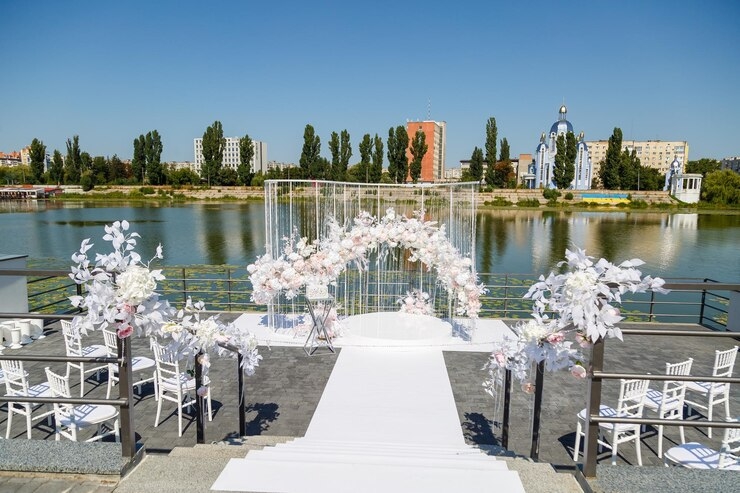
Introduction

What is a Destination Wedding?One of the most popular and desired ways to celebrate your special day is with a destination wedding. Unlike traditional hometown weddings, destination weddings take place in a beautiful setting, often far away from the couple’s home. This unique option allows you to say “I do” or “I do not” in front of the most beautiful backdrop, whether it’s a tropical beach, a historic castle, or a stunning countryside view.
Definition of a Destination Wedding
The term ‘destination wedding’ refers to a type of wedding that takes place outside of the bride and groom’s hometown. A traditional wedding is usually held in the bride’s hometown or close by. A destination wedding, on the other hand, is held in a beautiful, often exotic location. A destination wedding can take place on a beach in the tropics, in a historic city in Europe, in the countryside, or anywhere else that means something special to the bride and groom.
Why Choose a Destination Wedding?
Couples are choosing destination weddings for the following reasons, which are all strong ones:
- Exotic and Romantic Setting: By choosing a destination wedding, couples have the opportunity to exchange vows in breathtaking locations such as tropical beaches, historic castles, or scenic countryside landscapes.
- Intimate Experience: Destination weddings often have a smaller guest list, providing couples the chance to celebrate their special day with their nearest and dearest.
- Memorable Experience: Destination weddings allow couples and their guests to create lasting memories in a unique and memorable setting different from traditional wedding venues.
- Combined Wedding and Honeymoon: Destination weddings offer the convenience of combining the wedding ceremony and honeymoon, allowing couples to start their marital journey immediately after saying “I do.”
Choosing the Perfect Destination

Read More :- 10 Unique Wedding Decorations for Every Wedding Style
A crucial choice that affects your special day’s outcome is where you choose to get married. To choose a site that supports your vision, think about the following aspects.
Budget
Consider your budget and determine how much you are willing to spend on your destination wedding. Research destinations that offer the ambiance and amenities you desire while remaining within your financial constraints.
Guest List
Decide whether you want a small, intimate gathering or a larger celebration. Consider the number of guests you wish to invite and ensure the destination can accommodate your desired guest count.
Climate and Season
Evaluate the climate and weather conditions of potential destinations during your preferred wedding season. This will help you choose a location where the weather is conducive to your plans and overall comfort.
Legal Requirements
Research the legal requirements for getting married in your chosen destination. Some countries may have specific documentation or waiting periods, so it’s essential to familiarize yourself with these regulations beforehand.

Popular Destination Wedding Locations
Consider these popular destination wedding locations, each offering its own distinct charm:
Beach Destinations
- The pristine beaches of Bora Bora in French Polynesia offer a secluded and romantic setting for a beach wedding.
- The Riviera Maya in Mexico is a well-liked location for beach wedding couples since it has some of the most stunning beaches in the world and a lively culture.
Historical Venues
- A destination wedding in Italy’s scenic Tuscany region would have a lovely backdrop of quaint villas and vineyards, as well as a rich history and allure.
- For couples who want to say their vows amidst historic treasures, the captivating ruins of Machu Picchu in Peru provide a really special choice.
Scenic Countryside
- The picturesque background for a rural wedding in Ireland is its rolling hills, which are surrounded by quaint castles and verdant scenery that conjures up images from a storybook.

Planning Your Destination Wedding
Planning a destination wedding requires careful consideration and organization. To ensure a seamless and enjoyable experience for you and your guests, follow these steps:
A. Budgeting
When organizing a destination wedding, it is essential to set a reasonable budget. Take into account the following advice for destination weddings that are affordable:
- Research and compare prices of various vendors, accommodations, and services in your chosen destination.
- Opt for a wedding package offered by resorts or venues. These packages often include multiple services, offering better value for your money.
- Plan your wedding during the off-peak season. This can result in significant savings, as venues and vendors may offer discounted rates.
B. Guest List and Invitations
Managing guest expectations and ensuring clear communication is vital when planning a destination wedding. Here’s how you can navigate the guest list and invitation process:
- Openly discuss your plans with close family and friends to gauge their interest and potential availability before finalizing the guest list.
- Send out save-the-dates well in advance to allow your guests ample time to make travel arrangements and request time off work.
C. Legalities and Paperwork
Navigating the legalities and paperwork associated with a destination wedding requires attention to detail. Consider the following:
- Research marriage licenses and requirements in your chosen destination. Determine what documents are needed, such as passports, birth certificates, or divorce decrees.
- Work with a wedding planner or coordinator who is familiar with the legal procedures of your chosen destination.
D. Accommodation and Travel
Choosing suitable accommodations and arranging travel for your guests is essential for a successful destination wedding. Keep these points in mind:
- Select accommodations that can comfortably accommodate your guests, taking into consideration their preferences, budget, and proximity to the wedding venue.
- Negotiate group rates with hotels or resorts to secure the best possible prices for your guests.
E. Vendors and Services
- Assess the option of hiring local vendors versus bringing your own. Local vendors are often well-versed in the destination’s requirements and offer specialized knowledge that can enhance your wedding experience.
- Do your research on nearby caterers, photographers, performers, and other service providers. Find experts that share your vision and who have a track record of producing extraordinary results.
F. Activities and Entertainment
- Organize group excursions, such as snorkeling, hiking, or city tours, to allow guests to experience the destination’s unique offerings.
- Plan pre-wedding events, such as welcome dinners or cocktail parties, to provide an opportunity for guests to connect and mingle before the big day.
- Explore local entertainment options that showcase the destination’s culture, such as traditional dance performances or live music.

Dealing with Cultural Differences
It’s crucial to observe regional customs and be mindful of cultural standards when organizing a vacation wedding. Think about the following:
Respecting Local Traditions
Research and understand the customs, traditions, and etiquette of your chosen destination. Incorporate elements of the local culture into your wedding, displaying respect and appreciation for the host country.
Sensitivity to Cultural Norms
Ensure that your wedding plans and attire align with the cultural norms of the destination. Be mindful of any religious or cultural restrictions that may impact your wedding proceedings.
Managing Logistics and Timeline
To guarantee a seamless wedding day, it is essential to create a thorough wedding timeline and work with nearby suppliers and vendors. Think about the following actions:
- Draft a comprehensive wedding timeline that outlines the sequence of events leading up to and including the wedding day. Share this timeline with all relevant parties involved in the wedding planning process.
- Regularly communicate with local suppliers and vendors to confirm arrangements, discuss any changes or concerns, and ensure everyone is on the same page throughout the planning process.
Handling Potential Challenges
Destination weddings might provide particular difficulties that call for considerable thought and backup preparation. Use these tactics to overcome probable obstacles:
Weather Contingencies
For outdoor destination weddings, have a backup plan in case of inclement weather. Consider renting tents, marquees, or indoor venues to ensure your celebration can proceed regardless of the weather conditions.
Language Barriers
In destinations where the native language is different from your own, consider hiring a translator or working with a bilingual wedding planner to facilitate communication with local suppliers and vendors.
Guest Travel Issues
By giving visitors thorough travel information, such as advice on the best airports to fly into, transit choices, and contact information for any needed assistance, you can anticipate and resolve potential travel concerns.

Read More :- 10+ easy mehndi design ideas for your wedding
Decor and Themes
Your wedding experience can be improved by incorporating the site into your decor and selecting themes that go well with it. Take into account these suggestions:
- Use locally sourced flowers, foliage, or decorative elements that reflect the destination’s natural beauty and enhance the overall aesthetic.
- Select a theme that complements the destination’s ambiance. For example, a beach-themed wedding at a tropical destination or a rustic-themed wedding in a countryside locale.
Wedding Attire and Beauty
Choosing destination-appropriate attire and considering the climate is essential to ensure comfort and style on your special day. Keep these aspects in mind:
- Opt for lightweight fabrics and breathable designs in tropical or humid climates, such as chiffon or linen.
- Consider the season and weather conditions of the destination when selecting wedding attire. For example, choose warmer fabrics and accessories for winter destination weddings.
Photography and Memories
For destination weddings, capturing the spirit of the setting and keeping memories alive through photos is crucial. Take into account these suggestions:
- Discuss specific photo locations with your photographer to ensure the backdrop showcases the destination’s beauty and complements your vision.
- Plan a pre- or post-wedding photo shoot to get more pictures and explore the location’s various gorgeous locales.
Post-Wedding Activities and Celebrations
After the wedding ceremony, think about planning post-wedding festivities and saying “thank you” to your loved ones. Take into account these suggestions:
- Organize post-wedding activities, such as group excursions, brunches, or farewell parties, to extend the celebration and create lasting memories for you and your guests.
- Show your appreciation by sending thank you notes or post-wedding gratitude gestures to your guests for their presence and support throughout the whole destination wedding experience.
Budget-Friendly Tips and Tricks
Planning a destination wedding without compromising quality requires savvy budgeting strategies. Consider these money-saving tips:
- Look for all-inclusive wedding packages offered by resorts or venues. These packages often provide better value compared to booking individual services.
- Opt for off-peak wedding seasons or weekdays, as venues and vendors may offer discounted rates for these periods.
- Consider DIY options for decor, such as creating personalized centerpieces or designing your own wedding stationery, to save on costs.
In conclusion, planning a destination wedding necessitates careful consideration and attention to detail. By choosing the perfect destination, navigating logistics and legalities, incorporating cultural sensitivities, and focusing on memorable experiences, couples can create a truly unforgettable wedding celebration. Immerse yourself in the location, embrace the journey, and watch as the magic of your dream wedding materializes in a scene that perfectly captures your love story.





